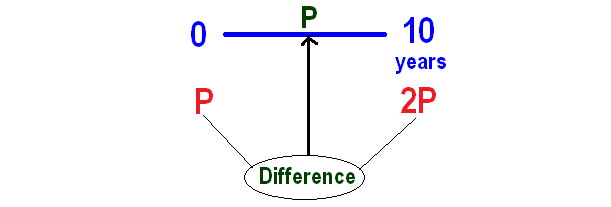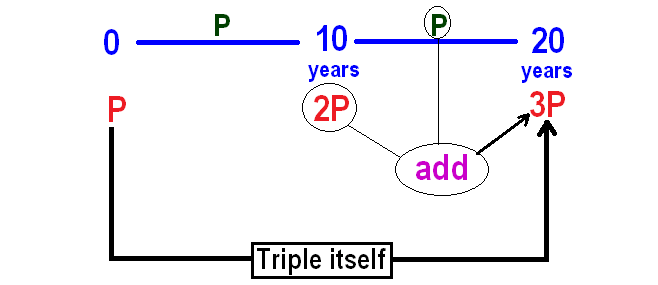SIMPLE INTEREST AND COMPOUND INTEREST WORKSHEET
Problem 1 :
Kyle bought a $2000 government bond that yields 6% in simple interest each year. Write the equation that gives the total amount A, in dollars, Kyle will receive when he sells the bond after t years.
Problem 2 :
An investor decides to offer a business owner a $20,000 loan at simple interest of 5% per year. Find the total amount in dollars, the investor will receive when the loan is repaid after 5 years.
Problem 3 :
Jonas has a savings account that earns 3 percent interest compounded annually. If his initial deposit is $1000, find the value of the deposit after 10 years.
Problem 4 :
Jay puts an initial deposit of $400 into a bank account that earns 5 percent interest each year, compounded semiannually. Find the value of the deposit after 4 years.
Problem 5 :
Veronica has a bank account that earns m% interest compounded annually. If she has opened the account with $200 and the expression $200(x)t represents the amount in the account after t years, then find the value of x in terms of m.
Problem 6 :
Daniel has $1000 in a checking account and $3000 in a savings account. The checking account earns him 1 percent interest compounded annually. The savings account earns him 6 percent interest compounded annually. Assuming he leaves both these accounts alone, write the expression that represents how much more interest Daniel will have earned from the savings account than from the checking account after 5 years.
Problem 7 :
Kristen opens a bank account that earns 4% interest each year, compounded once every two years. If she had opened the account with k dollars, write the expression that represents the total amount in the account after t years.
Problem 8 :
In simple interest, a sum of money doubles itself in 10 years. Find the number of years it will take to triple itself.
Problem 9 :
In simple interest, a sum of money amounts to $ 6200 in 2 years and $ 7400 in 3 years. Find the principal.
Problem 10 :
The difference between the compound interest and simple interest on a certain investment at 10% per year for 2 years is $631. Find the value of the investment.

Answers
1. Answer :
Formula for simple interest is
I = Ptr
Substitute.
= 2000 ⋅ t ⋅ 0.06
= 120t
Final value of the investment :
A = P + I
Substitute 2000 for P and 120t for I.
= 2000 + 120t
2. Answer :
Formula for simple interest is
I = Ptr
Substitute.
= 20000 ⋅ 5 ⋅ 0.05
= 5000
Final value of the investment :
A = P + I
= 20000 + 5000
= 25000
So, the investor will receive $25,000 when the loan is repaid after 5 years.
3. Answer :
Formula for final value in compound interest :
A = P(1 + r/n)nt
Because it is compounded annually, number of times interest compounded per year is 1. So, n = 1.
Substitute 1000 for P, 0.03 for r, 1 for n and 10 for t.
A = 1000(1 + 0.03/1)1 ⋅ 10
Simplify.
= 1000(1.03)10
Use calculator.
≈ 1344
So, the value of the deposit after 10 years is about $1,344.
4. Answer :
Formula for final value in compound interest :
A = P(1 + r/n)nt
Because it is compounded semiannually, number of times interest compounded per year is 2. So, n = 2.
Substitute 400 for P, 0.05 for r, 2 for n and 4 for t.
A = 400(1 + 0.05/2)2 ⋅ 4
Simplify.
= 400(1 + 0.025)8
= 400(1.025)8
Use calculator.
≈ 487.4
So, the value of the deposit after 4 years is about $487.40.
5. Answer :
Amount in the account after t years (given) :
A = 200(x)t ----(1)
Formula for final value in compound interest :
A = P(1 + r/n)nt
Because it is compounded annually, number of times interest compounded per year is 1. So, n = 1.
Rate of interest is m%, so we have
r = m/100
r = 0.01m
Substitute 200 for P, 0.01m for r and 1 for n.
A = 200(1 + 0.01m/1)1 ⋅ t
A = 200(1 + 0.01m)t ----(2)
Both the expressions (1) and (2) represent the the amount in the account after t years.
Comparing (1) and (2), we get
x = 1 + 0.01m
6. Answer :
Interest earned in checking account :
C.I = A - P
= P(1 + r/n)nt - P
= P[(1 + r/n)nt - 1]
Substitute.
= 1000[(1 + 0.01/1)1 ⋅ 5 - 1]
= 1000[(1.01)5 - 1]
= 1000(1.01)5 - 1000
Interest earned in savings account :
C.I = A - P
= P(1 + r/n)nt - P
= P[(1 + r/n)nt - 1]
Substitute.
= 3000[(1 + 0.06/1)1 ⋅ 5 - 1]
= 3000[(1.06)5 - 1]
= 3000(1.06)5 - 3000
The interest earned more in savings account than checking account :
= Interest in savings A/c - Interest in checking A/c
= [3000(1.06)5 - 3000] - [1000(1.01)5 - 1000]
= 3000(1.06)5 - 3000 - 1000(1.01)5 + 1000
= 3000(1.06)5 - 1000(1.01)5 - 2000
7. Answer :
Formula for final value in compound interest :
A = P(1 + r/n)nt
Because it is compounded once in two years, we have
n = 1/2 or 0.5
Substitute k for p, 0.04 for r and 0.5 for n.
A = k(1 + 0.04/0.5)(0.5) ⋅ t
Use calculator and simplify.
A = k(1 + 0.08)(1/2) ⋅ t
A = k(1.08)t/2
8. Answer :
Let P be the sum of money invested.
P becomes doubles itself in 10 years
So, P will be 2P in 10 years.
Now we can calculate interest for ten years as shown below.

From the above calculation, P is the interest for the first 10 years.
In simple interest, interest earned every year will be same.
So, interest earned in the next 10 years also will be P.
That is,

So, it will take 20 years for the principal to become triple itself.
9. Answer :
In 2 years, the sum of money amounts to $6200.
In 3 years, the sum of money amounts to $7400.
From the above information, we can calculate the interest earned in the 3rd year as shown below.

In simple interest, interest earned every year will be same.
Therefore, we can calculate the principal as shown below.

So, the principal is $3800.
10. Answer :
The difference between compound interest and simple interest for 2 years is
$631
Formula for difference between the compound interest and simple interest for 2 years at R percent annual interest rate is
P(R/100)2
Therefore, we have,
P(R/100)2 = 631
Substitute 10 for R.
P(10/100)2 = 631
P(1/10)2 = 631
P(1/100) = 631
P/100 = 631
Multiply each side by 100.
P = 63100
So, the value of the investment is $63100.
Kindly mail your feedback to v4formath@gmail.com
We always appreciate your feedback.
©All rights reserved. onlinemath4all.com
Recent Articles
-
AP Calculus AB Problems with Solutions (Part - 19)
Apr 24, 25 11:10 PM
AP Calculus AB Problems with Solutions (Part - 19) -
AP Calculus AB Problems with Solutions (Part - 18)
Apr 24, 25 11:06 PM
AP Calculus AB Problems with Solutions (Part - 18) -
Derivative of Absolute Value of x Using Limit Definition
Apr 23, 25 11:11 AM
Derivative of Absolute Value of x Using Limit Definition
